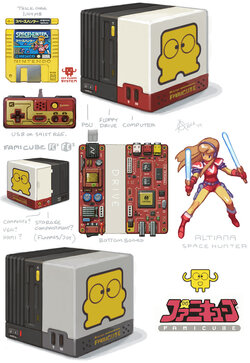- Joined
- Aug 23, 2018
What are your thoughts on modern 8-bit computers like the Commander X16, fantasy consoles like the Pico 8, and adjacent single board computers like the Raspberry Pi? Which do you like? Are they a viable platform for games? Have you made or played anything for them?
Every so often I'll end up down a rabbit hole of old computers. There's a romantic idea that everyone knows the hardware in and out, and programming on "bare metal" instead of dozens of layers of impenetrable bullshit. I see these videos, get inspired, and then do nothing.
Old computers are collectors objects for aging nerds. To fix this problem, said aging nerds have started various projects to make a cheap, available 8-bit computer from modern parts. The most famous is the Commander X16, made by the YouTuber 8bitGuy, that has had troubled development. There are many others.
One of the most famous is the Pico 8. A "fantasy console" you can program with strict limitations. A couple of games have made a splash like the Pico 8 port of Doom which is very impressive, but also has no effect on people who complain that the new Robocop and Starfield games have "outdated graphics". The Pico 8 has no physical console as far as I know, it exists purely in software.
I occationally hear about a console called the Famicube, but that seems to be an art and design project instead of something that actually exists. The art is neat though, and I recommend checking it out.

Which brings us all the way back to emulation. The whole "bare metal" idea gets thrown out when the most practical way of doing this is via emulation. They end up right back at the original point they were trying to escape in the first place, likely why the Pico 8 is the most successful one in terms of having games on it. But if you're just going to emulate a console, why not emulate an actual 8-bit console?
I enjoy making games using GB Studio. It's software that allows you to make GameBoy games using modern tools and scripting, while still within the harsh limited provided by the hardware. It's fun, even if no one plays the finished results. There's a similar tool for MegaDrive/Genesis that I've not tried. They supposedly work on real hardware too, but I've not tried that. I'm told by other devs it's quite a trip when you do.
Which brings us back around to the availability of said hardware and the cycle begins anew.
Oh, and I put this in games instead of tech because no one is using these machines for real tech things like web browsing or word processing. It's all games and game development.
Edit: Fixed typo.
Every so often I'll end up down a rabbit hole of old computers. There's a romantic idea that everyone knows the hardware in and out, and programming on "bare metal" instead of dozens of layers of impenetrable bullshit. I see these videos, get inspired, and then do nothing.
Old computers are collectors objects for aging nerds. To fix this problem, said aging nerds have started various projects to make a cheap, available 8-bit computer from modern parts. The most famous is the Commander X16, made by the YouTuber 8bitGuy, that has had troubled development. There are many others.
One of the most famous is the Pico 8. A "fantasy console" you can program with strict limitations. A couple of games have made a splash like the Pico 8 port of Doom which is very impressive, but also has no effect on people who complain that the new Robocop and Starfield games have "outdated graphics". The Pico 8 has no physical console as far as I know, it exists purely in software.
I occationally hear about a console called the Famicube, but that seems to be an art and design project instead of something that actually exists. The art is neat though, and I recommend checking it out.

Which brings us all the way back to emulation. The whole "bare metal" idea gets thrown out when the most practical way of doing this is via emulation. They end up right back at the original point they were trying to escape in the first place, likely why the Pico 8 is the most successful one in terms of having games on it. But if you're just going to emulate a console, why not emulate an actual 8-bit console?
I enjoy making games using GB Studio. It's software that allows you to make GameBoy games using modern tools and scripting, while still within the harsh limited provided by the hardware. It's fun, even if no one plays the finished results. There's a similar tool for MegaDrive/Genesis that I've not tried. They supposedly work on real hardware too, but I've not tried that. I'm told by other devs it's quite a trip when you do.
Which brings us back around to the availability of said hardware and the cycle begins anew.
Oh, and I put this in games instead of tech because no one is using these machines for real tech things like web browsing or word processing. It's all games and game development.
Edit: Fixed typo.
Last edited: